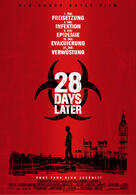The Significance of 28 Days Later in Horror Cinema

Introduction
Released in 2002, ’28 Days Later’ directed by Danny Boyle redefined the zombie genre and ignited a new wave of interest in horror films. The film’s gritty realism, combined with its innovative narrative structure and iconic imagery, has left an indelible mark on both the horror genre and popular culture. As the world grapples with various social and health crises, the themes explored in ’28 Days Later’ remain alarmingly relevant.
The Premise and Impact
Set in a post-apocalyptic London, ’28 Days Later’ follows Jim, a bicycle courier who awakens from a coma 28 days after a virus outbreak that transforms humans into rage-fueled creatures. This premise taps into fears about viral pandemics, social collapse, and the fragility of civilization. The film’s stark portrayal of a society in disarray resonated with audiences, particularly during the COVID-19 pandemic, prompting discussions about isolation, survival, and human nature.
Critically acclaimed upon release, ’28 Days Later’ broke away from the traditional zombie tropes of previous films, which often depicted slow-moving, lumbering zombies. Instead, Boyle introduced fast-moving infected individuals, heightening tension and delivering a relentless sense of dread. This change has been widely adopted by subsequent films, establishing a new standard within the zombie and horror genres.
Cultural Legacy and Influence
’28 Days Later’ not only redefined how zombie narratives are approached but also influenced a plethora of other media. Its blend of social commentary and horror has inspired filmmakers, video game developers, and writers, resulting in a resurgence of zombie-related stories in the years following its release. Films like ‘World War Z’, ‘Train to Busan’, and the hit series ‘The Walking Dead’ all owe a degree of homage to ’28 Days Later’ in their pacing and thematic exploration.
Conclusion
The enduring legacy of ’28 Days Later’ underscores the film’s significance in the horror genre and its reflection of societal challenges. As new generations discover the film, its exploration of fear, isolation, and the breakdown of society remains ever-relevant. The narrative continues to prompt viewers to consider how they would react in the face of an apocalypse while examining the darker aspects of human behaviour.
In an era characterised by uncertainty, ’28 Days Later’ serves not only as entertainment but as a cautionary tale that reminds us of our vulnerabilities. As the horror landscape continues to evolve, it is clear that the impact of this film will last for many years to come.







